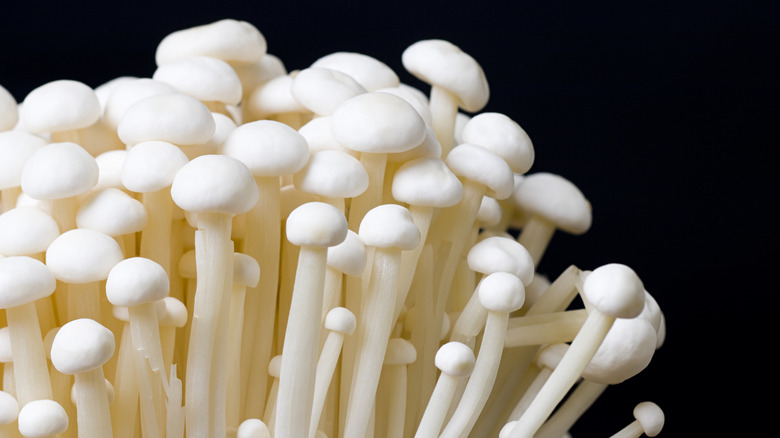Enoki Mushroom Warning Renewed As CDC Links It To 3 Illnesses
For many people, enoki mushrooms are a staple, a flavorful ingredient easy to add to a variety of dishes. Their mild flavor helps to increase the heartiness of recipes without bringing a strong bite like other fungi. Healthline reports enoki mushrooms offer a range of potential health benefits thanks to their high protein, niacin, and fiber content. They also have a lot of antioxidants, including ferulic and gallic acid, and may improve brain and heart function, too.
However, there are often recalls for enoki mushrooms that shouldn't be ignored. There's much to know about cooking with mushrooms like this, but what's most important is staying on top of these recalls to ensure you're not purchasing and consuming high-risk ingredients that could make you sick. Most recently, the U.S. Centers for Disease Control and Prevention warned that these mushrooms were linked to the onset of three illnesses. Here's what you need to know about the latest recall of this popular mushroom.
CDC warns against listeria risk with enoki mushrooms
The Food and Drug Administration reported on January 18, 2023 that an outbreak of Listeria monocytogenes is suspected to have caused illness in three people. All three individuals came in contact with enoki mushrooms sold by Utopia Foods, Inc., two of which ate at restaurants serving them, and a third may have come in contact with the fungi at an Asian grocery store. During testing, the FDA sampled imports from the distributor and found them positive for two separate strains of Listeria monocytogenes, both of which have been directly linked to the ill individuals.
This recall is actually the expansion of the original Utopia Foods, Inc. enoki mushroom recall from back in December 13, 2022. However, the initial recall did not report any illnesses, as noted by the FDA. This is not the first time enoki mushrooms have been linked to this dangerous strain. Listeria itself is quite common in the food industry and is noted for causing fevers, diarrhea, and a heightened risk of serious infection in certain high-risk groups. Data reported by Food Poisoning Bulletin shows this particular type of mushroom was recalled 11 times in 2022.

